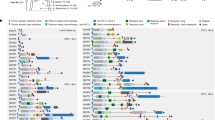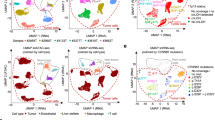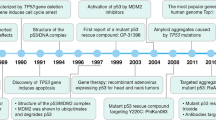Abstract
The tumor suppressor gene p16ink4a is homozygously deleted in numerous T as well as in some B lineage acute lymphoblastic leukemia (ALL). We therefore analyzed the clinical and biological implications of this feature by studying p16ink4a expression in 58 cases of childhood ALL. mRNA and protein were significantly correlated and both appeared more highly expressed in B than in T lineage ALLs: 13 out of the 15 T cell ALLs did not show any p16ink4a expression. The main result of this study is the strong prognostic value of p16ink4a expression. When stratifying the patients in three groups according to p16ink4a expression, we observed in univariate analysis: (1) the shortest disease-free survival for patients presenting a high p16ink4a level; (2) contrasting with the good prognosis in the group of patients expressing p16ink4a at low level; (3) while cases without any expression of the inhibitor were associated with a medium course of the disease (P = 0.0165). This prognostic value was confirmed by the multivariate analysis showing therapeutic regimen and p16ink4a protein expression as the only variables retained in the model. A specific metabolic profile related to cellular survival and proliferation was observed in each of the three p16ink4a expression groups. Among the cell cycle-related proteins we analyzed, only p21waf1 bcl-2 and CDK4 were significantly and positively correlated to p16ink4a. Furthermore, CDK6 was also strongly expressed in the group of cases with high p16ink4a level. An enhancement of p16ink4a, p21waf1 and bcl-2 was previously described in prolonged cellular survival, while aging cells showed a decrease in CDK4 expression. The concomitant high expression of the oncogenic protein CDK4 (and of CDK6), we observed, may amplify the leukemic advantage of prolonged lifespan blast cells by favoring cell progression through G1 phase. These data suggest that at least two mechanisms may be associated in the oncogenesis of very aggressive ALLs, ie deregulation of cell multiplication and prolonged blast lifespan.
This is a preview of subscription content, access via your institution
Access options
Subscribe to this journal
Receive 12 print issues and online access
$259.00 per year
only $21.58 per issue
Buy this article
- Purchase on Springer Link
- Instant access to full article PDF
Prices may be subject to local taxes which are calculated during checkout
Similar content being viewed by others
Author information
Authors and Affiliations
Rights and permissions
About this article
Cite this article
Mekki, Y., Catallo, R., Bertrand, Y. et al. Enhanced expression of p16ink4a is associated with a poor prognosis in childhood acute lymphoblastic leukemia. Leukemia 13, 181–189 (1999). https://doi.org/10.1038/sj.leu.2401303
Received:
Accepted:
Published:
Issue Date:
DOI: https://doi.org/10.1038/sj.leu.2401303
Keywords
This article is cited by
-
Chromosome 9p21 gene copy number and prognostic significance of p16 in ESFT
British Journal of Cancer (2007)
-
Prognostic significance of p16INK4a immunocytochemistry in adult ALL with standard risk karyotype
Leukemia (2001)



